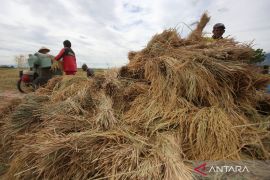"Domestic salt production is only able to meet 48 percent of overall national consumption, so 52 percent has to covered by imports totaling around 1.7 million tons per year ," Dr Arif Satria of the Human Ecology Faculty of the Bogor Institute of Agriculture (IPB) said here on Tuesday.
With coastlines that combined were the fourth longest in the world, Indonesia actually had huge potential to produce enough salt to meet its domestic demand, he said.
"Indonesia`s natural resource potentials are not being managed optimally, therefore the country has to import to meet its own salt needs," he said at a national seminar on "Salt Self-Sufficiency".
He said there were many obstacles domestic salt producers were facing.
Maritime Affairs and Fisheries Minister Sharif Cicip Sutardjo was the key speaker at the seminar.
The Indonesian government had decided to stop importing consumer salt in order to absorb local farmers` salt production.
Former maritime affairs and fisheries minister Fadel Muhammad had set himself the target of making the country self- sufficient in salt by 2014 and had taken initial steps to gradually reduce salt imports to 2.18 million tons by 2010 and to 1.02 million tons by 2011.
"I am totally opposed to the importation of salt and my stand is not negotiable. I want all Indonesians to cosume salt produced at home," Fadel said some time ago.
He said his ministry was already making efforts to increase the country`s salt production such as through the Smallholder`s Salt Program. He said Indonesia needed to follow the example of Brazil which was supporting development of its domestic salt industry.(*)
Editor: Aditia Maruli Radja
Copyright © ANTARA 2011











